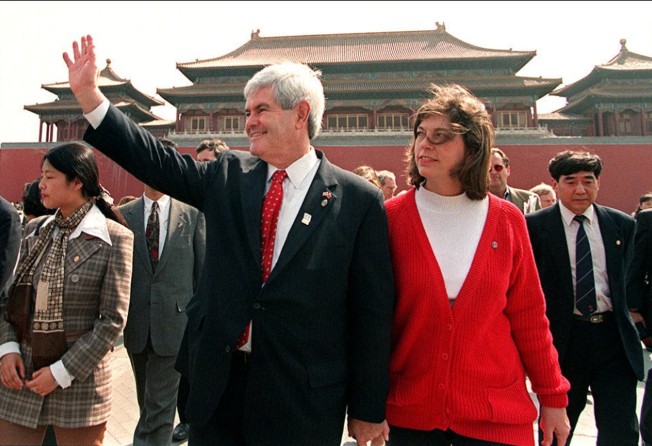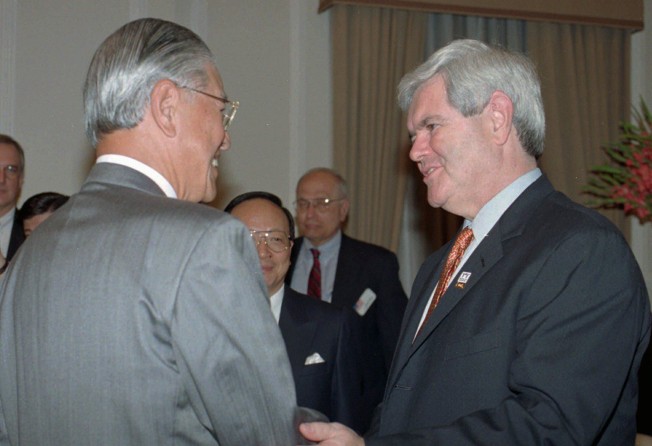
Why Beijing thinks Nancy Pelosi’s Taiwan visit is different to Newt Gingrich’s 1997 trip
- The last House speaker to visit the island did so at a time when both the US and China were keen to improve relations
- By contrast, bipartisan hostility to Beijing is growing in Washington and the authorities on the mainland regard Pelosi’s actions as ‘provocative’

Nancy Pelosi is not the first US House speaker to visit Taiwan, but the changed political backdrop means Beijing sees the situation very differently to Newt Gingrich’s 1997 trip, analysts have said.
On Tuesday, Gingrich told Fox News that when he visited the island he had reached a deal with Beijing, which also allowed him to visit the Chinese mainland. He then visited Japan before Taiwan to avoid travelling directly to the island from the mainland.
The house speaker is third in line in the presidential succession and Pelosi is the most senior US politician to visit the island since Gingrich. On Tuesday China’s ambassador to the US Qin Gang told CNN that the 1997 visit was “completely wrong”.
“The Chinese side was firmly opposed to it from the start,” Qin said. “The US side should draw a lesson from it, instead of making repeated mistakes, and one mistake cannot justify the following mistakes in the same nature.”
But Beijing’s reaction was muted in 1997 in contrast to the current visit, which prompted the People’s Liberation Army to announce a series of life-fire exercises around the island’s coastline and the mainland to impose new restrictions on cross-strait trade.
Su Hao, an international relations professor at China Foreign Affairs University, said Beijing viewed the intentions behind the two visits differently.
Back in 1997, seeking closer US-China ties was high on the agenda for both Republicans and Democrats in Washington.
“At that time, bilateral relations were improving and there’s a trend of cooperation between the two countries,” Su said, noting that Gingrich met president Jiang Zemin and premier Li Peng in 1997, as well as Wang Daohan, the former Shanghai mayor and one of China’s top officials on cross-strait relations.

“But now, Pelosi has defied warnings from China and the visit is very provocative, in a very high-profile way.”
Gingrich visited a month after vice-president Al Gore and shortly before Hong Kong’s handover to Chinese rule – a time when Beijing had no wish to let disputes with the US sour the atmosphere.
Both sides were also keen to improve relations, which had been under strain following a visit to the US by Taiwanese president Lee Tung-hui in 1995 and a subsequent series of PLA missile launches in the Taiwan Strait.
Gingrich, who had led the campaign to end sanctions on Beijing after the bloody Tiananmen crackdown in 1989, also expressed support for the Chinese government’s position that Taiwan and China are part of the same country.
Lee’s office issued a statement after Gingrich’s visit saying there was “no need to declare independence” because “the Republic of China [the official name used for the island] is an independent sovereign state”.
But now tensions between the US and China are running higher and Pelosi’s itinerary for the Taiwanese leg of her tour touched on many of Beijing’s sore points.
Unlike Gingrich, who only had a three-hour stopover, she stayed overnight and met President Tsai Ing-wen, lawmakers and dissidents and human rights activists, including former Causeway Bay Bookstore owner Lam Wing-kee, who fled to the island from Hong Kong in 2019, and former Tiananmen student leader Wuer Kaixi.
Although the US President tried to convince Beijing that Congress is a separate branch of the government to the White House, Xi Jinping warned Joe Biden in their recent phone conversation that Washington should not “play with fire” over Taiwan.
“The nature of the bilateral relationship between China and the US has changed and the Taiwan issue is being used as an outpost and a pawn in Washington’s efforts to contain China,” said Wang Yong, a professor with Peking University.
Bipartisan hostility over Beijing is also surging in Washington, Wang noted. “Both the Democrats and the Republics are competing to adopt a tough policy towards China and through the arms sales to Taiwan, the Taiwan issue has increasingly been shaped as a part of the ideological confrontations,” he said.
“China has to take a strong response, because the Taiwan issue is China’s core national interest.”
